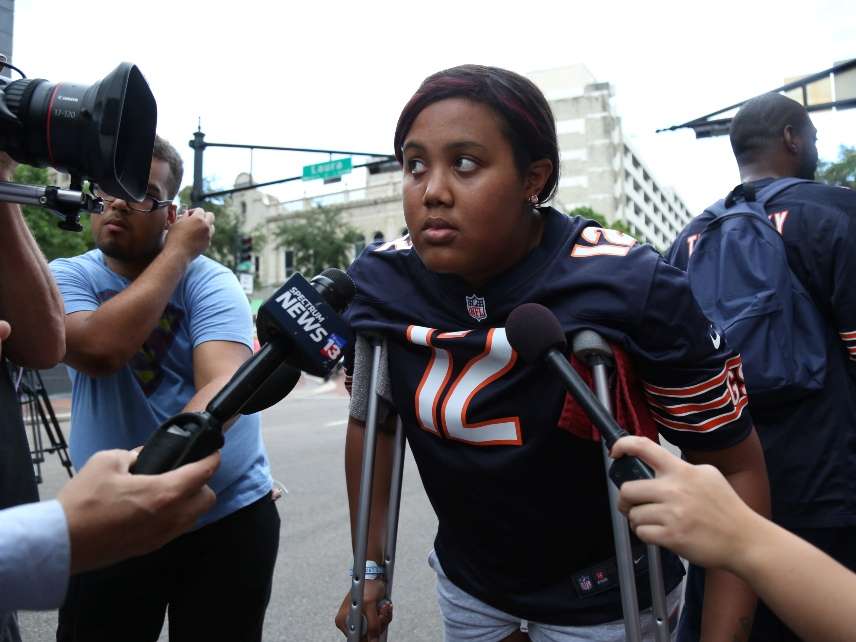Gun Controllers Insist 'Congress Knows' How to Prevent Attacks Like the Jacksonville Shooting, but No One Actually Does
None of the usual solutions seems apt.

This week's shooting at a video game tournament in Jacksonville has predictably provoked calls for stricter gun control, but the ritualistic recommendations make even less sense than usual. It is hard to imagine how any of the usual proposals could have prevented this attack.
David Katz, the 24-year-old gamer who police say murdered two people and injured 11 before killing himself, legally bought the two handguns he used from a dealer in Maryland. That state has some of the country's strictest firearm regulations, earning an A– from the Giffords Law Center to Prevent Gun Violence. Maryland bans so-called assault weapons, restricts magazine capacity, allows concealed carry for only a select few, requires handgun buyers to obtain a state license, keeps records of all handgun transfers, requires background checks for private sales, and imposes stricter screening criteria than the federal government. None of those measures stopped Katz from arming himself or carrying out his attack.
At first glance, another Maryland statute seems more relevant. A law that takes effect in October authorizes "extreme risk protection orders" that prohibit people deemed a danger to themselves or others from possessing firearms. Since Katz had a history of psychological problems and psychiatric treatment (none of which disqualified him from gun ownership under current state law), it is natural to wonder whether a relative, a police officer, or a mental health professional might have sought such an order if the option had been available. But as USA Today notes, "His mental health troubles appeared to have been largely in the past, and there were no signs of violence in recent years."
That's important under Maryland's new law, which allows a temporary protective order (lasting up to a week, but extendable for up to six months) without an adversarial hearing if there are "reasonable grounds" to believe someone poses "an immediate and present danger" to himself or others. A final order, which lasts up to a year and can be extended for another six months, can be issued after a hearing based on "clear and convincing evidence" that the respondent poses a danger to himself or others. Evidence can include threats or acts of violence, negligent handling of firearms, violation of other protective orders, and drug or alcohol abuse.
It's not clear that Katz ever met these criteria, although court records related to his parents' protracted divorce indicate that he was a troubled teenager with an "extremely hostile" attitude toward his mother who would play video games through the night and go days without bathing. As Daniel Webster, director of the Johns Hopkins Center for Gun Policy and Research, points out in the USA Today story, such behavior does not necessarily indicate that someone poses a threat to public safety.
"If we rolled back the clock and you showed me his background, would I say he'd commit a mass shooting?" Webster asks. "I wouldn't." He notes that "the best predictor of future violence is prior violence," while "being treated for a mental health condition is a poor predictor for future acts of violence," since "the vast majority of people being treated for mental illness aren't a threat."
Even if a judge could have been persuaded to issue an extreme risk protection order against Katz back when his parents were most concerned about him, it would have expired years ago. "Probably none of today's gun control measures would have kept a firearm from Katz," USA Today observes.
Gun controllers are unfazed. After the Jacksonville attack, Gabrielle Giffords, the former congresswoman who survived a mass shooting in 2011 and co-founded of the gun control organization that bears her name, issued a press release in which she insisted that "Congress knows steps they can take to stop this madness," but legislators "simply lack the courage to act."
That was as specific as Giffords got. But Allison Anderman, managing attorney at the Giffords Law Center, argues that state officials should have broader authority to stop people from buying guns. "If Maryland allowed law enforcement discretion when issuing handgun licenses," she told USA Today, "they might have been able to prevent this individual from buying a handgun based on his psychiatric record if they believed that he would not be someone who would use a gun safely."
The existing federal criteria for gun ownership, which exclude anyone who has ever undergone court-ordered psychiatric treatment, already take away the Second Amendment rights of many people who pose no threat to others. Anderman's suggestion that the rule should be extended to people who undergo treatment voluntarily would magnify that injustice while discouraging people from seeking psychological help by increasing the stigma and threatening them with the loss of constitutional rights.
Maryland has enacted almost all of the measures that groups like Anderman's have been pushing for years, based on the argument that they would prevent crimes like Katz's. Although they demonstrably have failed to do so, gun controllers say that only proves even more restrictions are necessary. But a net that's wide enough to catch someone like Katz is also wide enough to catch millions of innocent people who will never hurt anyone.


Show Comments (104)